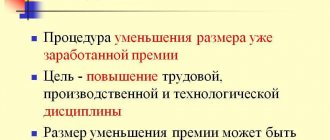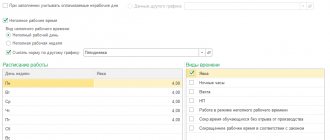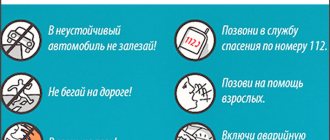The relationship between a reprimand as a disciplinary sanction and deprivation of a bonus
The concept of disciplinary measures is established in Art. 192 Labor Code of the Russian Federation. This is the responsibility of employees for failure to perform or improper performance of labor duties.
It is possible to impose only such penalties as are provided for by the legislation of the Russian Federation - the Labor Code of the Russian Federation, other laws, Charters, etc. The Labor Code of the Russian Federation provides for only 3 types of penalties; rebuke; dismissal.
Additional liability measures may be applied to a limited number of persons (for example, civil servants), and have no relation to general categories of employees. In addition, the penalties do not include deprivation of bonuses to employees.
Deprivation of bonuses is not a disciplinary sanction.
Thus, the legislation does not provide for such a disciplinary measure as deprivation of a bonus; therefore, as a general rule, it is impossible to deprive a bonus for a disciplinary offense. In this light, a reprimand and deprivation of a bonus are in no way connected, however, below we will analyze a specific situation when, after a reprimand, it is possible to deprive a bonus.
Deprivation of a bonus and a reprimand: compatible or not?
An employee who does not fulfill his job duties or performs them improperly commits a disciplinary offense (Article 192 of the Labor Code of the Russian Federation). Such an employee can be called to order by applying disciplinary measures to him:
- comment;
- rebuke;
- dismissal.
Federal and industry regulations may provide for other types of disciplinary sanctions for certain categories of citizens. Other disciplinary measures not provided for by law are illegal.
The relationship between bonuses and penalties is a pressing issue for managers and HR specialists. In particular, they are interested in the question: is it possible to apply disciplinary action and deprivation of bonuses at the same time?
Yes, you can do that. A bonus is an incentive payment, the purpose of which is to stimulate employees who conscientiously perform their job duties (Part 1 of Article 191 of the Labor Code of the Russian Federation).
If the Regulations on Bonuses or another local regulatory act of the organization regulating this area determines that employees who received a penalty are not paid a bonus, then the answer to the question “Is disciplinary action in the form of a reprimand and deprivation of a bonus possible?” will be positive (Letter from the Ministry of Labor RF dated March 14, 2018 No. 14/1OOG-1874).
Types of bonuses must be specified in the Regulations on bonuses or another similar document. If the Regulations on Bonuses allow the deprivation of a bonus (or reduction of it) in the presence of a disciplinary sanction, then a reprimand and at the same time deprivation of bonuses are legal.
Can a reprimand and deprivation of bonus be applied at the same time?
In order for deprivation of a bonus on the basis that the employee has been reprimanded to become possible, three conditions must be met.
- The organization must have adopted an internal document, for example, a local act, regulating both the procedure for paying bonuses and the grounds for their deprivation.
- An internal document must state that if an employee is reprimanded, then a bonus, even a well-deserved one, is not paid to him. If there are no such provisions, then even if the employee is reprimanded, he cannot be deprived of bonuses.
- An employee must earn a bonus by fulfilling the bonus conditions set out in the company’s internal document (for example, by fulfilling the plan, or by not allowing defective products to be produced based on the results of a certain period). You cannot deprive an employee of what he does not deserve. If the employee has not fulfilled the conditions for bonus payment, then this does not amount to deprivation of bonuses, since the grounds for payment have not arisen.
When all three conditions are met, a reprimand may be issued and subsequent deprivation of the bonus (based on this).
For clarity, let's give an example.
Have a question? We'll answer by phone! The call is free!
Moscow: +7 (499) 938-49-02
St. Petersburg: +7 (812) 467-39-58
Free call within Russia, ext. 453
The organization has a Regulation on bonuses. It states that if the employee fulfills the monthly plan, he is paid a bonus based on the results of the month. In addition, the Regulations reflect that if an employee is subject to disciplinary action, the monthly bonus is not paid.
Ivanov A.A. fulfilled the monthly plan, and accordingly deserved a bonus. However, that same month he was reprimanded for absenteeism. Thus, the employer, on the basis of the Bonus Regulations, rightfully deprived Ivanov A.A. well-deserved bonuses.
It is impossible to apply a penalty in the form of a reprimand and deprive a bonus at the same time. Why? More on this further...
Is it possible to reprimand and deprive of bonus at the same time?
The nuances of applying disciplinary sanctions were explained by Norma labor law expert Lenara KHIKMATOVA:
– Is it possible to deprive an employee of a bonus and reprimand him for the same offense?
– It all depends on whether such a measure of influence as deprivation of a bonus for an employee who has violated labor discipline is provided for in the local regulatory act of the organization - a collective agreement, regulations on bonuses, etc. Moreover, it is possible not to pay the bonus only if this local act specifies specific rules and conditions under which it can not be paid at all or the amount can be reduced.
If it is established locally that a bonus for a certain period is not paid in the presence of an outstanding disciplinary sanction, then the employee - in addition to punishment in the form of a reprimand, fine or dismissal - is allowed to be deprived of the bonus. This is not a violation of labor laws, since the company determines the terms of bonuses independently.
As follows from the Labor Code, the forms and systems of remuneration, bonuses, additional payments, allowances, and incentive payments are established in collective agreements, as well as other local acts adopted by the employer in agreement with the representative body of employees. Thus, the law provided the employer with almost complete freedom of action to create its own bonus system, limited only by the need to take into account the opinion of the workforce.
The possibility of deprivation of a bonus can also be established in the Internal Labor Regulations. For example, in the internal labor regulations approved by the Ministry of Employment and Labor Relations, the corresponding paragraph () reads as follows: “For employees for violation of labor discipline, in addition to disciplinary liability, other measures of influence may be applied by local acts (deprivation of bonuses, remuneration based on work results for the year in whole or in part, etc.).
If an employee has violated labor discipline, you can simultaneously impose a disciplinary sanction on the employee and deprive him of his bonus with one order. The order can be issued in any form; current legislation does not contain a unified form for such a document. Cm. .
At the same time, do not forget that deprivation of bonuses is not a type of disciplinary sanction, but an independent measure of influence on the employee.
A comprehensive list of disciplinary measures that can be applied to an employee for violation of labor discipline is listed in the Labor Code. This is a reprimand, a fine and termination of the employment contract. And deprivation of bonuses is a kind of additional method of influencing employees with “rubles”.
Attention According to the Plenum of the Supreme Court of April 17, 1998 No. 12, the imposition of a disciplinary sanction on an employee does not exclude the application to the perpetrator of other measures of influence provided for by legislative and other regulatory acts on labor that are not disciplinary sanctions (deprivation of bonuses, reduction or deprivation of remuneration based on the results of work for year, etc.).
But the prize of the prize is different! As we already know: the issue of paying or depriving a bonus, as well as reducing its size, is decided locally. However, in one case, labor legislation contains a direct prohibition on remuneration of an employee during the period of validity of a disciplinary sanction. This applies to so-called “one-time” incentive measures for success in work that are not provided for by the remuneration system . What does it mean?
The fact is that there is a double interpretation of such a concept as “premium”. On the one hand, the bonus is part of the employee remuneration system, on the other hand, it is an incentive for work. For proper application and registration of bonus payments, it is necessary to clearly distinguish between these concepts.
A bonus as part of the remuneration system is a monetary payment of an incentive nature, provided for by local regulations. And an employee who meets the targets and complies with the terms of the bonus is entitled to receive it.
And bonuses, with which in some cases the employer rewards employees one-time for special achievements in work (exceeding the plan, introducing an innovation proposal) or long-term and impeccable work at the enterprise, are considered an incentive . One-time incentives can also include non-monetary forms such as gratitude, a valuable gift, a trip to a sanatorium, etc. This is exactly the kind of incentive that an employee will not receive if he has an outstanding disciplinary sanction.
– How long does the disciplinary period last?
– The validity period of a disciplinary sanction cannot exceed 1 year from the date of its application. If during this period the employee is not subject to a new disciplinary sanction, he is considered to have no disciplinary sanction. Repayment occurs automatically after a year, so there is no need to issue a separate order for this.
An employer can also lift a disciplinary sanction early:
- on their own initiative;
- at the request of the employee;
- at the request of the work collective or the employee's immediate supervisor.
In this case, an order is necessary.
If an employee is deprived of a bonus during a disciplinary sanction, the payment of remuneration is resumed upon expiration of its validity period or from the moment an order is issued for early removal of the punishment.
Experts' explanations reflect their opinions and create an information basis for you to make independent decisions.
Is it permissible to apply a reprimand and deprivation of a bonus in one order?
Both the deprivation of bonuses and the imposition of disciplinary sanctions (in particular, a reprimand) are carried out on the basis of orders from the employer.
The legislation does not prohibit the use of arbitrary forms of orders, as well as the combination of various issues requiring resolution in one order. However, we highly recommend issuing two orders - one on the imposition of a reprimand, and the second on the deprivation of bonuses.
The fact is that deprivation of a bonus is carried out on the basis that the employee has been reprimanded, that is, one follows from the other. A reprimand will be applied only when the corresponding order is drawn up and signed. If you combine the announcement of a reprimand and deprivation of bonuses in one document, the basis for deprivation of bonuses will not arise, since the disciplinary sanction will not take effect until the order to impose it is signed.
***
Thus, the presence of a reprimand can serve as a basis for deprivation of a bonus, but only if this issue is correctly regulated in the company’s internal documents, for example, in the Regulations on Bonuses.
How long does a severe reprimand last?
13. Employees from among the first-year cadets of educational institutions of the Ministry of Internal Affairs of Russia in the period from the beginning of the academic year to the end of the first intermediate certification are paid a bonus at the rate of twenty-five percent of their salary.
Police reprimand consequences salary
And the fact that such a disciplinary sanction was imposed, i.e. immediately a severe reprimand, then this is no longer the discretion of the authorities, everything is individual, maybe subjective. Appeal to the court, you know, during my 8 years of service, only one employee appealed a disciplinary sanction in court.
A reprimand as a disciplinary sanction is provided for in Art. 192 Labor Code of the Russian Federation. This article will discuss what procedure an employer should follow when applying a punishment of this kind, as well as how such actions can be appealed by an employee.










